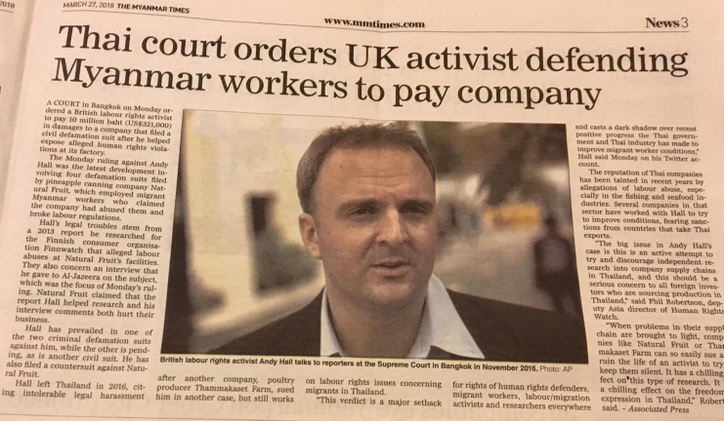News from the Field: Why Civil Society is Essential in the Fight Against Forced Labour
Electronics Watch's latest findings on migrant workers' risk of debt bondage and forced labour in the electronics sector in Thailand underscore the need for strong and vigilant civil society organisations that can monitor risk, educate workers about their rights, and craft solutions in collaboration with employers, public officials, and international buyers.
 Article in Myanmar Times. The Thai court verdict has been widely condemned by leading human rights institutions.
Article in Myanmar Times. The Thai court verdict has been widely condemned by leading human rights institutions.
Unfortunately, the long-standing criminal defamation cases against migrant workers who report rights abuses in Thailand and the recent Thai court ruling against Migrant Worker Rights Specialist, Andy Hall, a research partner of Electronics Watch, in apparent retaliation for his reports on human rights violations against migrant workers, chill freedom of speech and inhibit civil society. (For more on the case against Andy Hall, see Finnwatch).
Electronics Watch first raised concerns about migrant workers' risks of forced labour in November 2016. The Burmese Migrant Worker Rights Network (MWRN) in Thailand reported that an electronics company was unlawfully withholding passports and other identity documents of migrant workers from Myanmar and charging these workers exorbitant and unethical recruitment fees. When MWRN and Electronics Watch brought the situation to the attention of industry groups they took remedial action and MWRN soon reported that workers had received their passports and work permits and the employer had started to compensate them for illegitimate fees and wage deductions.
Yet, Electronics Watch has found continued risk of forced labour. Migrant workers, who since 2017 face stiff penalties if they do not have a valid work permit, reported that they have to incur high debts during the process of obtaining such permits, amounting to the equivalent of workers' pay for 55-76 days including overtime. The process is both lengthy and costly, requiring workers to resign from their present employment, travel to Myanmar and back to Thailand, and once again back to Myanmar and return to Thailand, where they can then finally and legally be employed directly at their place of work. Using subcontracted migrant workers is prohibited since November 2017.
Some workers stated they borrowed money from informal moneylenders or "loan sharks," while others said they used their savings or money set aside for remittances to supplement loans and pay for the registration process. Workers also reported being caught in excessive overtime dependency to pay off their debt.
There are an estimated four million registered and unregistered migrant workers from Myanmar in Thailand, at risk of debt bondage and forced labour. But their plights rarely see the light of day without the research and reporting of civil society and human rights defenders, such as Andy Hall. While the recruitment process is complicated and remedies will require a degree of coordination between brand buyers and employers, one simple and effective step forward would be for the industry to collaborate transparently with civil society in devising solutions. This is especially important in the current repressive climate in Thailand where a signal from industry about the value of civil society would be a strong message to the Thai government to honour and respect the role of human rights defenders in creating decent work.

